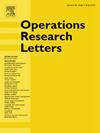资源流动与市场绩效:康德最优化
IF 0.9
4区 管理学
Q4 OPERATIONS RESEARCH & MANAGEMENT SCIENCE
引用次数: 0
摘要
本研究回顾了在无限时间范围内的差异化商品双寡头博弈,其中生产需要开发可再生的移动资源。在本研究中,我们假设(i)两家公司表现出附加的康德行为,(ii)他们生产差异化的产品。我们发现,无论从短期还是长期的角度来看,当企业的初始资源存量相同时,资源流动程度都不会影响稳定反馈均衡的结果。本文章由计算机程序翻译,如有差异,请以英文原文为准。
Resource mobility and market performance: Kantian optimization
This study revisits the differentiated goods duopoly game over an infinite time horizon, where production requires exploiting renewable mobile resources. In this study, we assume that (i) the two firms exhibit additive Kantian behavior and (ii) they produce differentiated goods. We find that the degree of resource mobility does not influence the stable feedback equilibrium outcome from either a short- or long-term perspective if the firm's initial resource stocks are the same.
求助全文
通过发布文献求助,成功后即可免费获取论文全文。
去求助
来源期刊

Operations Research Letters
管理科学-运筹学与管理科学
CiteScore
2.10
自引率
9.10%
发文量
111
审稿时长
83 days
期刊介绍:
Operations Research Letters is committed to the rapid review and fast publication of short articles on all aspects of operations research and analytics. Apart from a limitation to eight journal pages, quality, originality, relevance and clarity are the only criteria for selecting the papers to be published. ORL covers the broad field of optimization, stochastic models and game theory. Specific areas of interest include networks, routing, location, queueing, scheduling, inventory, reliability, and financial engineering. We wish to explore interfaces with other fields such as life sciences and health care, artificial intelligence and machine learning, energy distribution, and computational social sciences and humanities. Our traditional strength is in methodology, including theory, modelling, algorithms and computational studies. We also welcome novel applications and concise literature reviews.
 求助内容:
求助内容: 应助结果提醒方式:
应助结果提醒方式:


